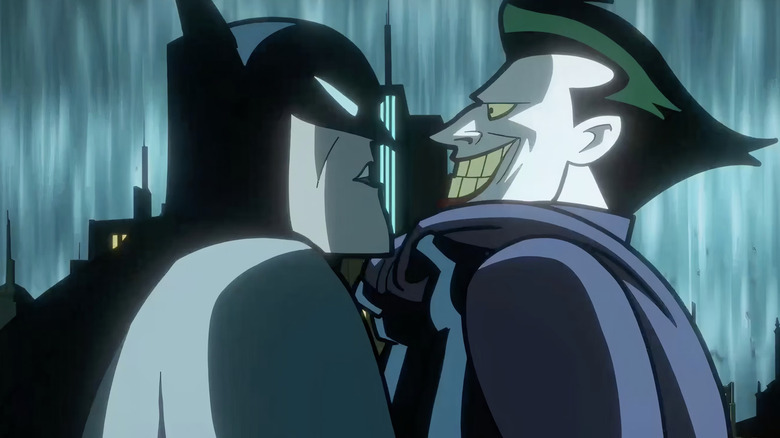Crisis On Infinite Earths: The Mark Hamill Joker Voice Controversy, Explained
In the build-up to the release of "Justice League: Crisis on Infinite Earths — Part Three," the most intriguing detail was learning "Crisis" would feature the late Kevin Conroy voicing Batman one last time, having recorded his lines before his passing in 2022. Sweetening the news, it was subsequently announced that Conroy would be acting against Mark Hamill as Joker, if only for a moment. Their shared cameo recreates the animation style of "Batman: The Animated Series" (down to Gotham City's red sky), the 1992 cartoon where Conroy and Hamill first played Batman and the Joker.
But when I went to watch the scene, feeling I owed Mr. Conroy a peek at his Batman final curtain, my eyebrow shot up. The Joker in the scene did not sound like Mark Hamill. The cadence was there, but not the vocal quality. But the film's credits insisted it was Hamill, so I shrugged and brushed it off as his voice changing after he's been voicing the Joker for 30 years.
Turns out, it wasn't Hamill. The temp vocal track recorded for Joker's performance was mistakenly left in the movie when it was sent out for digital and physical release. A temp track is a recording of a film's audio (such as music or character dialogue) used as a placeholder in the editing process. Such tracks are always meant to be swapped out with the final audio, but an oversight in production meant Hamill's lines as the Joker were left out.
Warner Bros. supplied the following statement to /Film (via Rafael Motamayor):
"Due to a manufacturing issue, a temporary voice over was inadvertently left in the final version of "Justice League: Crisis on Infinite Earths — Part Three," affecting the character of The Joker. Digital versions of the film have been proactively corrected and have replaced the incorrect version of the film in users' accounts. Consumers who purchased affected physical copies of the film can receive a replacement copy by contacting WHV@wbd.com."
It's time to give voice actors appropriate respect
Artist Marcelo Millicay shared a video comparing the scene with Joker's temp track and the updated version featuring Hamill.
Felt that Hamill's performance as Joker sounded weird in Crisis on Infinite Earths Part 3?
Well, that's because it wasn't Mark Hamill.
The digital rental file of the movie has just been updated to include Mark Hamill's performance. pic.twitter.com/HuAAMUM2np
— Marcelo Millicay (@millicay95) August 12, 2024
Believe it or not, this is not the first time something like this happened this year. "X-Men '97" episode 5 "Remember It," features the Hellfire Club's Black King, Sebastian Shaw. Once I heard Shaw's voice, I knew Travis Willingham was playing him — I've watched way too much "Fullmetal Alchemist" to not recognize Colonel Roy Mustang's voice. But the episode's credits listed Todd Haberkorn as playing Shaw. I was confounded but accepted I was wrong ... until I saw Willingham confirm on Twitter it was him voicing Shaw.
Dats me 😬
— Travis Willingham (@WillingBlam) April 10, 2024
Evidently, someone on the production got his part confused with Haberkorn's (who is in "X-Men '97," voicing Henry Gyrich). As of this writing, the error in the credits of "Remember It" has not been corrected on Disney+.
This happening to voice acting veterans like Willingham and especially Hamill? Embarrassing and part of a larger pattern where voice actors don't get their proper due. Video game actors (which includes a host of voice actors) are currently on strike to secure protections for themselves, particularly against their performances being replaced with generative AI.
Rachael Lillis, the original English voice of Misty and Jessie on "Pokémon," passed away on Saturday, August 10, 2024. Previously, her sister Laurie Orr needed to post a GoFundMe campaign to cover Lillis' cancer treatment and living expenses. (An all too common phenomenon when living under America's broken healthcare system, of which actors are not immune.) Lillis' financial struggles are part of a ghoulish pattern of dub voice actors receiving little compensation for their work.
If you're an animation fan, you would do well to remember the voices of your favorite characters belong to real human beings who deserve proper credit and dignity (as all people do.)

